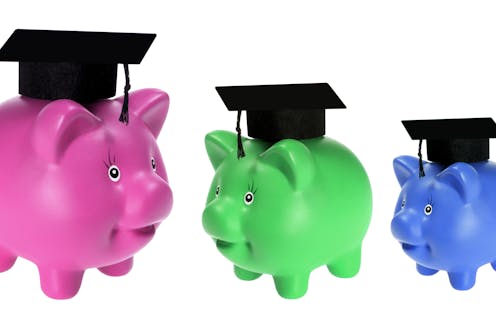Students' choice of university has no effect on new graduate pay, and a small impact later on. What they study matters more
- Written by Andrew Norton, Professor in the Practice of Higher Education Policy, Australian National University

Every year in Australia school leavers suffer ATAR anxiety, worrying about whether they will get into their preferred course and university. New research[1] by the Commonwealth Department of Education, using Australian Taxation Office earnings data, examines in detail how much difference what a person studies, and where, makes to their future income.
It finds students’ course choices matter more than their choice of university. Qualifications in some fields of study lead to much higher incomes nine years after graduation. Which university a student attends has little influence on short-term graduate earnings, but differences emerge over time.
Read more: Let's not focus on graduate incomes when assessing the worth of education[2]
Why might graduates of some universities earn more?
We would expect some university effect on earnings. Universities vary in their teaching quality, at least as measured by student satisfaction[3]. In theory, those whose graduates learn more could expect labour market rewards.
Whether justified by objective learning gains or not, some universities are better known and more prestigious than others. This could influence employers when choosing between job applicants.
And some universities, especially those with many full-time and on-campus undergraduates, offer greater networking opportunities. The people met at university could open up employment and business opportunities.
Why might graduates of some courses earn more?
Previous research shows graduate earnings vary greatly[4] according to a degree’s field of education.
Some degrees are entry points to specific occupations. The pay for those jobs is a major influence on graduate earnings. Other degrees provide more general skills that are valued to a greater or lesser extent in the labour market.
These differences reflect market conditions, occupational regulation and political decisions more than how good either the university or the graduate might be. University and graduate factors can influence who gets hired and promoted, but job markets set the salary range.
Read more: Want to improve your chances of getting a full-time job? A double degree can do that[5]
What do the department’s results show?
The Department of Education’s graduate income report[6] and accompanying spreadsheets[7] show earnings at various time points after graduation. I will mainly discuss the medium-term results, as at 2017-18 for people who graduated in the late 2000s.
As the chart shows, bachelor degree earnings differ significantly by the field of study nine years after graduation. At the high end, half of medical graduates reported annual incomes of A$149,500 or more (the median). A quarter earned $206,900 or more (the 75th percentile). The equivalent figures for performing arts were $53,000 and $80,300.
The overall results (including fields not shown here) were a median of $77,100 and a 75th percentile of $102,600.

















